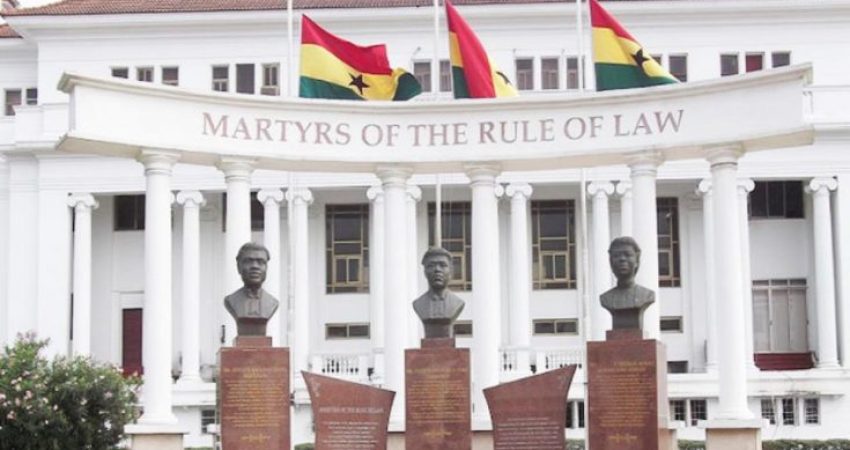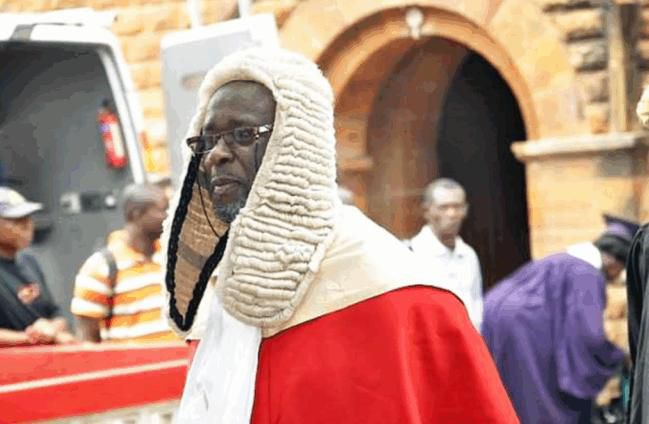Ghana’s Minority in Parliament has cautioned Acting Chief Justice, Justice Paul Baffoe-Bonnie, to brace himself for a thorough and uncompromising vetting process before the Appointments Committee. The warning follows Speaker of Parliament Alban Bagbin’s referral of President John Dramani Mahama’s nomination of Justice Baffoe-Bonnie as Chief Justice to the committee for consideration on Tuesday, October 21, 2025.
The vetting is expected to be one of the most closely watched events of the current parliamentary session, as it will determine the next head of Ghana’s judiciary at a time when confidence in public institutions remains fragile.
Speaking during parliamentary proceedings, Minority Leader Alexander Afenyo-Markin voiced strong concerns about what he described as “constitutional lapses” in the process leading to Justice Baffoe-Bonnie’s assumption of the acting role. He argued that proper constitutional procedures must always be followed, especially when it involves key positions within the judicial arm of government.
According to Mr. Afenyo-Markin, the Minority will approach the vetting process with diligence and objectivity but will not compromise on the standards required for such a high office. “The one who has been nominated for the Chief Justice position must come prepared to earn the approval of the House,” he said. “If you come unprepared — you do not have your judgments or clarity on your conduct, and there are questions about your role in your predecessor’s removal — you will have to provide convincing answers.”
His remarks underscore the growing expectation that nominees for top judicial positions demonstrate transparency, competence, and a deep commitment to constitutional values.

The Appointments Committee, chaired by the First Deputy Speaker, is expected to begin hearings in the coming days. The committee’s work will include examining Justice Baffoe-Bonnie’s legal opinions, past rulings, ethical record, and his vision for the judiciary.
Observers anticipate a vetting process similar in intensity to those of former Chief Justices Kwasi Anin-Yeboah and Gertrude Torkornoo, both of whom faced detailed questioning on judicial independence, political neutrality, and reforms in the justice system. The hearings are likely to attract broad public interest, given the critical role the Chief Justice plays in shaping the judiciary’s credibility.
The appointment of a new Chief Justice is not merely a routine administrative process; it has deep implications for the rule of law and governance in Ghana. The Chief Justice serves as both head of the judiciary and the Judicial Council, overseeing the administration of courts and safeguarding judicial independence.
In recent years, public debates around judicial integrity have intensified, with concerns about political interference and delays in the justice system. Transparency International’s 2023 Corruption Perceptions Index ranked Ghana 70th out of 180 countries, and public trust in key state institutions — including the judiciary — has shown mixed trends, according to Afrobarometer.
Legal analyst and University of Ghana lecturer, Dr. Kwaku Asare, has argued that “a strong, independent judiciary is critical to maintaining democratic checks and balances, especially in politically competitive environments like Ghana.” The vetting of Justice Baffoe-Bonnie, he added, “offers an opportunity to reinforce that independence through public scrutiny.”

Justice Paul Baffoe-Bonnie is a senior member of the Supreme Court with over three decades of service in Ghana’s judiciary. He has presided over several landmark cases and served in various capacities across the judicial hierarchy.
A graduate of the University of Ghana and the Ghana School of Law, Justice Baffoe-Bonnie joined the bench in the 1990s and rose through the ranks to become an Appeal Court judge before his appointment to the Supreme Court. His nomination follows the retirement of Chief Justice Gertrude Torkornoo in mid-2025, after her mandatory retirement age.
While Justice Baffoe-Bonnie is widely respected within legal circles, his critics point to controversial judgments and internal judicial administrative decisions that may draw scrutiny during the vetting process.
As Parliament resumes its final quarter sittings for 2025, the Appointments Committee’s handling of the Chief Justice nomination is expected to set the tone for other pending executive nominations. The committee’s mandate is to assess nominees’ qualifications and integrity before recommending them for approval or rejection by the full House.
Political watchers believe the outcome will signal how Parliament intends to exercise oversight on appointments to high offices under President Mahama’s administration. Civil society groups, including the Ghana Centre for Democratic Development (CDD-Ghana), have consistently called for transparent and non-partisan vetting processes to enhance accountability and strengthen public confidence.

Ghana’s judiciary, while constitutionally independent, has faced sustained calls for reform — particularly around case backlog, court automation, and ethical conduct among judges. According to the Judicial Service’s 2024 annual report, more than 200,000 civil and criminal cases remained pending nationwide, with a growing demand for faster, tech-driven adjudication systems.
Justice Baffoe-Bonnie, if confirmed, will inherit these structural challenges alongside expectations to uphold judicial discipline and restore public trust. Legal practitioners have urged that the new Chief Justice prioritize institutional efficiency and improved public engagement with the courts.
The vetting of Justice Paul Baffoe-Bonnie is therefore not just a procedural exercise — it is a test of Ghana’s democratic maturity and institutional transparency. How Parliament manages this process will influence perceptions of judicial independence and the balance of power among the branches of government.
As the Minority insists on a rigorous screening and the Majority calls for fairness, Ghanaians will be watching to see whether the Appointments Committee’s proceedings reflect the principles of accountability, merit, and respect for the rule of law.
Read also: GES Cracks Down on Illegal PTA Levies to Protect Parents and Students

